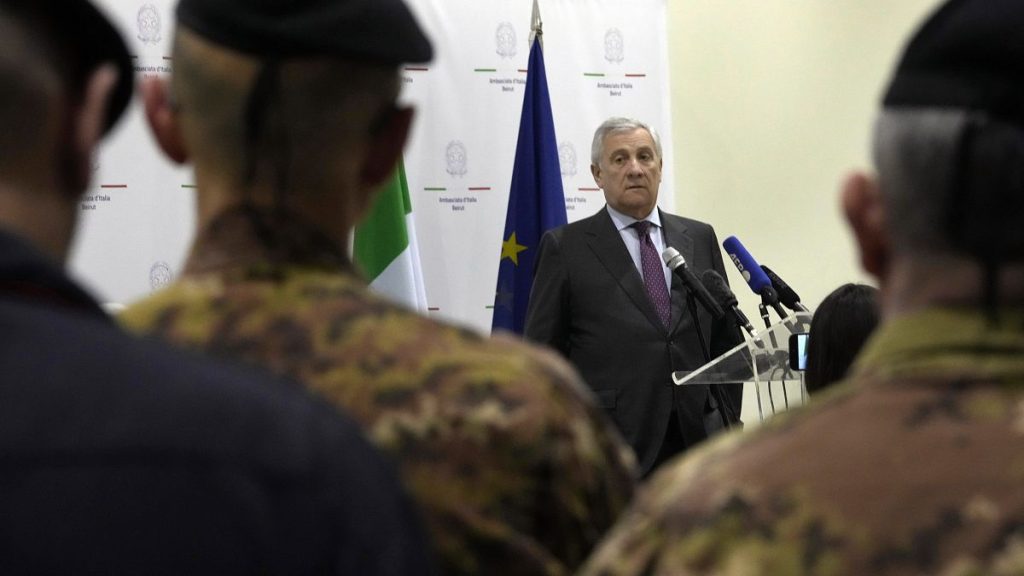Antonio Tajani, Italy’s Foreign Minister, embarked on a significant diplomatic mission to the Middle East, engaging with key figures in both Lebanon and Syria. His visit, aimed at fostering stability and peace in the volatile region, centered around discussions with newly-elected Lebanese President Joseph Aoun and Syrian de facto leader Ahmed al-Sharaa. Tajani’s trip underscored Italy’s commitment to playing a constructive role in mediating regional conflicts and promoting dialogue between opposing factions.
In Beirut, Tajani’s meeting with President Aoun emphasized the importance of Lebanon’s stability in contributing to broader regional peace, particularly in the context of the ongoing Israeli-Palestinian conflict. Tajani expressed confidence that Aoun’s leadership could play a crucial role in strengthening ceasefires in southern Lebanon and potentially accelerating a ceasefire in Gaza. He highlighted the urgent need to address the humanitarian crisis in Gaza, emphasizing the tragic loss of life and the plight of hostages. This underscores Italy’s concern for the well-being of civilians caught in the crossfire and its desire to see a swift resolution to the conflict. Tajani further solidified Italy’s commitment to Lebanon’s security by engaging with the Italian contingent serving within the United Nations Interim Force in Lebanon (UNIFIL), acknowledging their crucial role in maintaining peace and stability in the region.
Italy’s substantial contribution to UNIFIL, comprising approximately 1,067 troops, including the Italair unit specializing in helicopter operations, highlights the country’s long-standing commitment to the UN peacekeeping mission. Italair, staffed primarily by the Italian Army with support from the Navy and Air Force, represents Italy’s longest-serving international mission unit, consistently supporting UN activities in Lebanon since 1979. Tajani’s engagement with these troops demonstrates Italy’s unwavering support for their mission and recognition of the risks they face, particularly in light of past attacks on UNIFIL bases. Tajani’s condemnation of the December rocket attack that wounded four Italian peacekeepers underscores the precarious security situation in the region and the dangers faced by peacekeeping forces.
Tajani’s visit to Syria marked a significant step in Italy’s re-engagement with the country following the fall of long-time ruler Bashar al-Assad. His meeting with Ahmed al-Sharaa, the head of the new Syrian administration, signaled Italy’s willingness to engage with the new leadership and contribute to the country’s reform process. Tajani’s discussions with Syrian Foreign Minister Asaad al-Shaibani further underscored Italy’s commitment to fostering dialogue and cooperation with the Syrian government. The reopening of the Italian embassy in Damascus last year signifies Italy’s renewed diplomatic presence in the country and its intention to play a more active role in Syria’s future.
Italy’s focus on economic cooperation with Syria reflects a pragmatic approach to rebuilding the war-torn nation. Tajani emphasized Italy’s desire to be a “bridge” between the new Syria and the European Union, suggesting a potential role for Italy in facilitating Syria’s reintegration into the international community. This approach contrasts with the more cautious stance adopted by some other European nations, indicating Italy’s willingness to engage with Syria despite the ongoing political complexities and human rights concerns. This approach could potentially open pathways for economic assistance and development, albeit with careful consideration of the political landscape and potential challenges.
Tajani’s diplomatic efforts in Lebanon and Syria represent a multifaceted approach to addressing complex regional challenges. By engaging with both governments and supporting peacekeeping initiatives, Italy seeks to contribute to stability and promote dialogue. The willingness to re-engage with Syria and foster economic cooperation signals a pragmatic approach aimed at rebuilding the country and facilitating its reintegration into the international community. This proactive diplomatic strategy, while potentially controversial, highlights Italy’s commitment to playing a constructive role in a volatile region and its ambition to bridge the gap between the new Syria and the European Union. This approach requires careful navigation of the complex political landscape and ongoing human rights concerns to ensure that any engagement contributes positively to Syria’s future.

